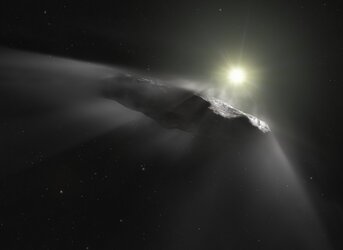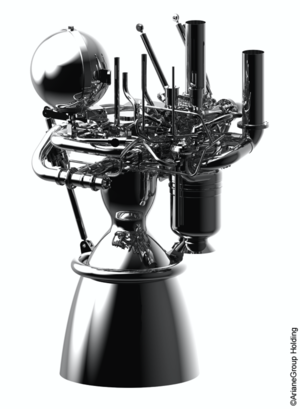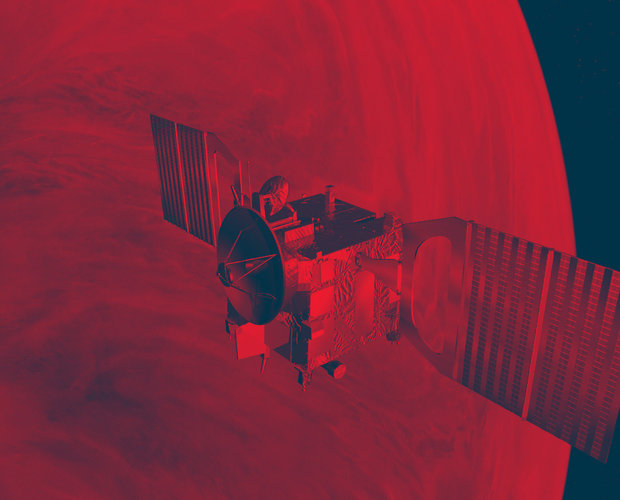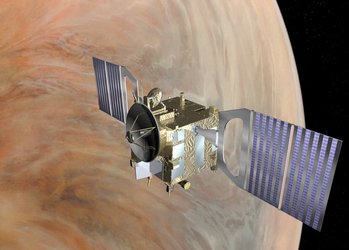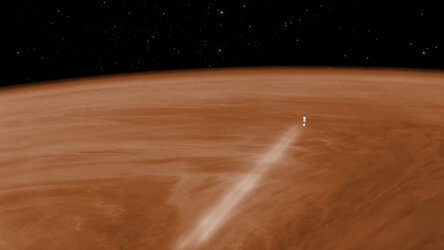Spacecraft Operations Manager: An interview with Andrea Accomazzo
Andrea Accomazzo is the 35-year-old Spacecraft Operations Manager (SOM) for ESA's Venus Express mission. He's always been interested in flying, but Venus Express is taking him farther and faster than he ever dreamed.
ESA Spacecraft Operations Manager, Venus Express
Born: 27 July 1970 in Domodossola, Italy
Baccalaureate and masters in aerospace engineering, Politecnico di Milano, 1995
Experience: Initially studied at the Italian air force academy as a pilot trainee. After deciding to pursue a civilian career, he switched to Milan's Polytechnic University, specialising in aerospace engineering. After several years at Fiat Avio, where he helped design the Vega launch vehicle and the Rosetta lander, he joined ESA in 1999, working at ESOC on Rosetta; Venus Express is his first mission as Spacecraft Operations Manager. Working directly for the Ground Segment Manager, he oversees the Flight Control Team of 13 engineers, analysts and controllers dedicated to Venus Express. Andrea enjoys living in Germany with his wife, who is a trained nurse. In his spare time, he visits the nearby Odenwald for hiking and biking.
ESA: How did you become interested in spacecraft operations?
Andrea: I always thought being a pilot was a great job, but really I love the technology involved in spaceflight. The science focus of Venus Express is tremendously interesting, but I love the engineering. It's incredible to think that we are going to orbit Venus, a planet much closer to the Sun than Earth.
Venus Express will only be the fifth mission to orbit Venus. Operating the mission is one of the highlights for me - we will have daily contact with the spacecraft. If all you do is help build a satellite, you can lose touch with the project once it's launched.
ESA: What's been the biggest change for you personally in joining Venus Express?
In two years, I have gone from managing myself to managing a team of 13 people.
Andrea: It's a challenge to build a team. In two years, I have gone from managing myself to managing a team of 13 people. I am happy to say that the team spirit has been pretty good; it has really grown in the past few months as we have become focused on launch.
We work hard, but we have fun too. I would say that good team spirit is absolutely essential for reducing tension and stress, particularly during launch, the Low Earth Orbit Phase (LEOP) and Venus Orbit Insertion (VOI).
ESA: How do you foster teamwork?
Andrea: The key is to make sure everyone is working towards a common target. We have both ESA staff and contractors from industry working together and I must say there is absolutely no difference or distinction; everyone is extremely professional and works towards our mission goals.
ESA: What motivates you each morning?
Andrea: This may sound a little techie, but I find the process of helping create the mission's ground segment to be tremendously interesting. Our challenge is to develop, test and implement a system that can handle the routine operations - and the science operations - of a craft that will orbit Venus.
It's a great challenge and means we have to integrate a lot of systems. I'm usually pretty tired each day, and have no problem to sleep at night, but I also have no problem getting out of bed and into ESOC!
ESA: Is there anything you would change about your job?
The science focus of Venus Express is interesting, but I really love the engineering. I love the technology involved in space flight.
Andrea: I miss the mountains! I grew up in Masera, in the north of the Italian alps in the Monta Rosa region. The town is only 300 metres up, but it's surrounded by mountains. I guess I wish there were more mountains around Darmstadt.
ESA: What's happening in the future?
Andrea: I haven't had too much spare time to think about that; I will stay with Venus Express for some time. I am looking forward to the experience of routine operations once we're in orbit around Venus.
ESA: What advice would you give somebody who wanted to work in space exploration?
Andrea: I think the most important thing is that it has to be a genuine passion. Development times are relatively long compared to other fields and this can sometimes lead to frustration or to the feeling that you never get there. If you aren't really motivated it can be hard.
If this is no issue, then the next step is to apply for a job, trainee period, anything that can be related to space. There aren't many chances and one has to exploit all of them. It took me several years and sacrifices before I could really say: yes, this is what I wanted to do, but now it is great.















 Germany
Germany
 Austria
Austria
 Belgium
Belgium
 Denmark
Denmark
 Spain
Spain
 Estonia
Estonia
 Finland
Finland
 France
France
 Greece
Greece
 Hungary
Hungary
 Ireland
Ireland
 Italy
Italy
 Luxembourg
Luxembourg
 Norway
Norway
 The Netherlands
The Netherlands
 Poland
Poland
 Portugal
Portugal
 Czechia
Czechia
 Romania
Romania
 United Kingdom
United Kingdom
 Slovenia
Slovenia
 Sweden
Sweden
 Switzerland
Switzerland















